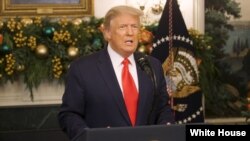U.S. President Donald Trump threatened Tuesday to not sign a massive year-end bill passed by Congress that includes nearly $900 billion in coronavirus aid and $1.4 trillion in annual government funding.
In a video posted on social media, Trump highlighted what he called “wasteful spending” on various programs that are common in annual U.S. funding measures, such as military aid to Egypt, museum funding and money for agricultural and wildlife efforts.
His specific objections to the coronavirus relief portion focused on what he said was insufficient help for small businesses that have suffered during the pandemic, and on the size of direct payments to individuals.
The bill that overwhelmingly passed both houses of Congress includes $600 for most individuals, half the level from a March aid package. Trump says it should be $2,000 per person this round.
"I am asking Congress to amend this bill and increase the ridiculously low $600 to $2,000, or $4,000 dollars for a couple,” Trump said. “I'm also asking Congress to immediately get rid of the wasteful and unnecessary items from this legislation and to send me a suitable bill or else the next administration will have to deliver a COVID relief package.”
Democrats had pushed for larger payments as part of a much larger coronavirus relief package, including a $3 trillion version the House passed in May and one totaling $2 trillion it approved in October. But neither advanced in the Senate as Republicans opposed that level of spending and pushed for a more focused relief effort.
House Speaker Nancy Pelosi responded to Trump’s video with a pledge to bring the issue of larger payments to a vote.
“Republicans repeatedly refused to say what amount the President wanted for direct checks,” she tweeted. “At last, the President has agreed to $2,000 — Democrats are ready to bring this to the Floor this week by unanimous consent. Let’s do it!”
Trump also objected to the new bill’s inclusion of payments to households with mixed immigration status, such as a U.S. citizen married to someone who does not have a Social Security Number. Such cases were excluded from the first round of payments, and the new bill would not only make them eligible for the new round, but also retroactively include the amount they would have received from the stimulus checks earlier in the year.
The president was publicly quiet about the relief package as negotiations between Democratic and Republican leaders accelerated in recent weeks. But his Treasury Secretary, Steven Mnuchin, was part of the talks that resulted in the measure backed by a 359-53 vote in the House and 92-6 in the Senate on Monday, and Trump had been expected to sign it.
If Trump were to veto the funding package, Congress could override his objection with a two-thirds vote in each chamber.
With no resolution, there is the prospect of a government shutdown. The U.S. government is currently operating on a temporary extension of funding that expires December 28.
The push for new coronavirus relief comes during a surge in COVID-19 infections, with the United States recording about 215,000 new cases each day and with the death toll standing at more than 322,000 people, according to the Johns Hopkins Coronavirus Resource Center.
The new bill includes $284 billion for the Paycheck Protection Program, an initiative meant to help businesses keep workers employed during a period in which the economic pressure of the pandemic may have forced added layoffs.
There is also $300 per week in unemployment benefits for 11 weeks, as well as $82 billion for local schools and universities, $25 billion in rental assistance, $15 billion for theaters and $10 billion for childcare. The bill includes $4 billion to help other countries with vaccination efforts for COVID-19, the disease caused by the coronavirus.
President-elect Joe Biden, who is set to take office next month, has expressed support for the coronavirus relief package, while saying it is just a first step.
"Leaders of both House and Senate, both parties deserve credit for making the hard compromises to get this done,” Biden said Tuesday. “But, like all compromises, it's far from perfect, but it does provide vital relief at a critical moment. However, as I've said all along, this bill is just the first step, a down payment in addressing the crisis, the crises, more than one, that we're in."
Senate Majority Leader Mitch McConnell, in comments to the Associated Press late Monday, signaled a wait-and-see approach from the Republicans.
“My view about what comes next is let's take a look at it,” he said. “Happy to evaluate that based upon the needs that we confront in February and March."
Any new round of spending will be highly dependent on two January 5 runoff elections for Senate seats representing the state of Georgia that will either keep Republicans in control of the chamber or give Democrats the advantage of holding both houses of Congress and the White House.







